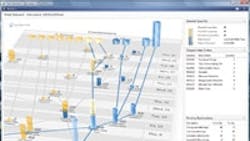As multiple clipboards give way to multifunction dashboards, some form of enterprise resource planning (ERP) software is becoming an integral part of business plans for manufacturers of every size. Although this trend has been slower to catch on at the smaller end of the spectrum, the saturation of ERP at the enterprise level has brought small and midsize businesses (SMBs) into the spotlight, spurring development of differing solutions by vendors of all sizes to capture this final frontier of customers.
According to a December 2006 study from analyst firm Aberdeen Group, 34% of SMBs either have no ERP system or a seriously outdated implementation in place. Many have been so far resistant to adopt the latest generation of ERP applications, believing that the expense, implementation time and continuing maintenance fees will drain it of value. Others are caught between the competing ideas of upgrading existing systems or replacing them with competing applications. A third group hasn't bought in to the concept altogether.
In an extension of a general industry trend, companies looking at an ERP investment right now are being offered the software-as-a-service (SaaS) model as a kind of compromise, with the capital investment in the technology mitigated by the flexible pricing model, quicker implementation and lower overall cost of these Web-hosted applications. In fact, a recent study on ERP solutions by Gartner Research states that by 2010 30% of new license purchases will be in the SaaS format.
Yankee Group analyst Gary Chen agrees, noting, "ERP has traditionally been a heavily customized application, but the SaaS ERP you see in the market right now is a volume business, targeted mainly at small companies who can live with minimal customization."
Jutras references "best-of-breed" vendors such as Plexus Online, Glovia Services and NetSuite as offering pure on-demand solutions. She also notes that SAP, Oracle and Infor all are now offering some sort of ERP hosting, as does IBM through its partnership with Lawson. Late last year, Microsoft -- which already owns much of the SMB ERP space -- launched a subscription licensing model that enables customers to rent its own hosted versions of its Dynamics ERP applications on a monthly basis.
See Also
About the Author
Brad Kenney
Chief Marketing Officer
Brad Kenney is the former Technology Editor of IndustryWeek and now serves as director of the mobile/social platforms practice at R/GA, a global marketing/advertising firm in New York City.
